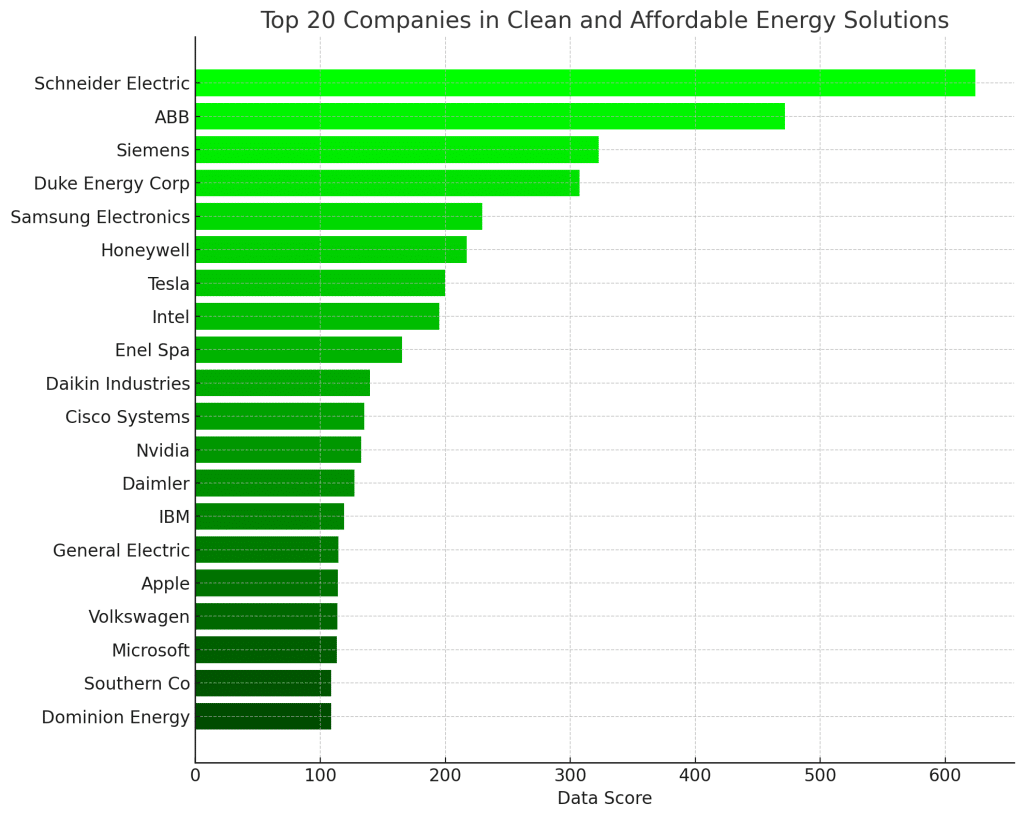Ahead of International Energy Week, Permutable AI has released its latest rankings of the companies best perceived for clean and affordable energy solutions based on our news sentiment analysis and market intelligence. This list showcases those that are perceived to be at the helm of the clean and affordable energy revolution, with Schneider Electric, ABB, and Siemens earning top spots for their outstanding contributions.
As the global community increasingly acknowledges the necessity of clean and affordable energy for both combating climate change and supporting the growth of critical sectors like agriculture, business, and healthcare, the urgency for more rapid advancements towards sustainability targets has never been clearer. Permutable AI’s cutting-edge analysis brings to light the companies leading the charge towards a more sustainable future.
Top 20 companies perceived for clean and affordable energy solutions
| Rank | Company | Data Score |
|---|---|---|
| 1 | Schneider Electric | 623.88 |
| 2 | ABB | 471.52 |
| 3 | Siemens | 322.79 |
| 4 | Duke Energy | 307.36 |
| 5 | Samsung Electronics | 229.52 |
| 6 | Honeywell | 217.29 |
| 7 | Tesla | 199.92 |
| 8 | Intel | 195.3 |
| 9 | Enel Spa | 165.5 |
| 10 | Daikin Industries | 139.58 |
| 11 | Cisco Systems | 135.03 |
| 12 | Nvidia | 132.66 |
| 13 | Daimler | 127.43 |
| 14 | IBM | 119.21 |
| 15 | General Electric | 114.52 |
| 16 | Apple | 114.05 |
| 17 | Volkswagen | 113.76 |
| 18 | Microsoft | 113.4 |
| 19 | Southern Co | 108.88 |
| 20 | Dominion Energy | 108.62 |
A closer look at the leaders
The rankings reveal a diverse group of companies making significant strides across the clean energy spectrum. Let’s take a closer look at some of the leaders here:
- Schneider Electric’s efforts are deeply embedded in its core strategy, focusing on renewable energy solutions, energy efficiency, and smart grid technology. Their commitment to R&D in clean technology has led to the development of EcoStruxure, an IoT-enabled architecture that drives efficiency and sustainability by leveraging advancements in AI, robotics, and cyber security.
- ABB stands out for its pioneering work in electrification and automation technologies that facilitate the integration of renewable energy into existing grids, enhancing the reliability and efficiency of energy systems worldwide. ABB’s focus spans a wide range of technologies, including high-efficiency robotics and electrification products, aimed at reducing energy consumption and minimizing environmental impact. Their investment in digital solutions and services, such as ABB Ability™, underscores their commitment to leading the industrial digital transformation, offering significant advancements in operational efficiency and sustainability.
- Siemens, another titan in the field, has demonstrated exceptional leadership in clean energy through its extensive portfolio of energy-efficient solutions, ranging from gas and steam turbines that can run on a mixture of hydrogen and natural gas, to cutting-edge wind turbines and energy storage technologies. Siemens’ commitment to renewable energy and digitalization in the energy sector is evident in their development of smart grid solutions that optimize the distribution and use of electricity, thus facilitating a more sustainable energy landscape.
Tesla, a name synonymous with the electric vehicle revolution, continues to lead the charge in transforming the automotive industry towards sustainability. Its pioneering approach extends beyond the production of EVs to include the development of high-capacity batteries, solar panels, and the Supercharger network, aiming to create a comprehensive ecosystem for electric mobility. Tesla’s commitment to innovation has not only popularised EVs but also set new standards for vehicle performance, safety, and environmental impact.
Mercedes-Benz, under its parent company Daimler, is making significant strides in the electric mobility space. With the launch of the EQ brand, Mercedes-Benz has embarked on an ambitious plan to electrify its vehicle lineup, introducing a range of fully electric and plug-in hybrid models. This move is complemented by investments in charging infrastructure and research into battery technology, signaling a strong commitment to electric mobility and the reduction of carbon emissions. Mercedes-Benz’s strategy reflects a broader industry shift towards sustainable fuel alternatives and cleaner transportation solutions.
Intel’s journey towards sustainability is marked by its relentless pursuit of innovations in energy-efficient processors and semiconductor technologies. These advancements are pivotal in addressing one of the tech industry’s most significant challenges: the environmental impact of data centres and computing infrastructure. By developing processors that require less energy for data processing and cooling, Intel is helping to drastically reduce the carbon footprint associated with digital operations. This commitment extends beyond their products to their operational practices, with Intel aiming for net-positive water use, zero waste to landfill, and 100% renewable energy use across their global manufacturing operations, setting a new benchmark for sustainability in the technology sector.
Microsoft’s approach to sustainability is holistic and ambitious, reflecting its global influence and responsibility. The tech giant’s pledge to become carbon negative by 2030 encompasses a wide range of initiatives designed to reduce its environmental impact and foster a sustainable future. Microsoft is investing heavily in renewable energy sources, aiming to power its data centres, buildings, and campuses with 100% renewable energy. Furthermore, the company is pushing the boundaries of carbon reduction technologies, exploring and funding projects that remove carbon from the atmosphere. Microsoft’s sustainability strategy also includes the development of cloud-based tools and AI to help other organisations track and reduce their carbon emissions, demonstrating a commitment to collective action against climate change.
Nvidia’s role in promoting energy efficiency and renewable energy solutions leverages its core strengths in graphics processing units (GPUs) and AI. The company’s GPUs are at the heart of complex computations needed for deep learning and AI applications, which are increasingly used to optimise energy consumption in various sectors. For instance, Nvidia’s technology enables smarter grid management and more efficient renewable energy distribution, helping to balance supply and demand with greater precision. Additionally, Nvidia’s AI platforms are used to improve the efficiency of buildings and industrial processes, reducing energy use and emissions. By harnessing the power of AI and machine learning, Nvidia is contributing to the creation of more sustainable energy systems and promoting a shift towards cleaner, more efficient use of resources.

Innovation at the forefront
The top 20 companies, ranging from energy conglomerates to tech firms, exemplify commitment to cleaner energy sources and a dedication to addressing the global sustainability challenge. Permutable AI’s CEO, Wilson Chan, emphasises the importance of recognising these companies during International Energy Week, stating, “We aim to shed light on the positive progress being made towards a sustainable future, countering the often pessimistic narratives with a message of hope and action.”
Methodology behind the rankings
Our data analysis aimed to comprehensively evaluate companies as perceived in regards to clean and affordable energy. The dataset was gathered from 500,000 articles scanned daily, ensuring a broad and current representation of market sentiments. Sentiment analysis was performed on the textual data extracted from articles related to each company. This involved assessing the overall sentiment expressed towards a company in the media. The sentiment analysis algorithms considered positive, negative, and neutral sentiments, providing a nuanced view of the public perception.
To delve deeper into sentiment analysis, we identified and quantified specific positive and negative data points within the articles. This allowed us to gauge the factors contributing to a company’s positive or negative sentiment, providing valuable insights into public opinion. The culmination of our analysis is reflected in the end data score, a composite metric synthesizing various factors. This score, ranging from 0 to 1000, represents an aggregate evaluation of the company’s perceived performance concerning clean and affordable energy. The methodology ensures a balanced and holistic assessment of each company’s standing within its respective industry.
To ensure the inclusion of companies with significant market influence and substantial data coverage, a minimum market capitalisation threshold of £50 million was applied. Additionally, a minimum data cap of 50 articles ensured that companies were evaluated based on a substantial volume of relevant information, enhancing the accuracy and reliability of the analysis.
By combining these parameters, our methodology aims to provide a comprehensive and nuanced perspective on companies leading the global transition towards clean and affordable energy, contributing to the ongoing dialogue on sustainability and corporate responsibility.
Towards a sustainable future
As the global community prepares for International Energy Week, the unveiling of Permutable AI’s rankings serves as a timely reminder of the critical role that innovation and commitment play in the energy sector. The companies leading in clean and affordable energy solutions, as identified in this ranking, not only pave the way for a more sustainable future but also set benchmarks for excellence and responsibility in an industry that is at the heart of global development and environmental stewardship.
This comprehensive analysis, underpinned by cutting-edge AI-driven sentiment analysis, offers an unparalleled insight into the companies at the forefront of the clean energy revolution. It reflects a broader shift towards sustainability, where clean and affordable energy is not just a goal but a guiding principle for development across all sectors. As these companies continue to break new ground with their innovative solutions and investments in clean technology, they not only contribute to environmental sustainability but also to economic and social resilience worldwide.
The findings highlight the importance of cross-sector collaboration and the influential role of technology in advancing the clean energy agenda. From Schneider Electric’s leadership to the emerging commitment of automotive giants like Daimler and tech innovators such as Intel and Microsoft, the landscape of clean energy solutions is both diverse and dynamic. This diversity emphasizes the multifaceted approach required to tackle the complex challenges of climate change and sustainable development.
Looking ahead, the AI-driven intelligence provided by Permutable AI highlight the urgency and opportunity for continued innovation and investment in clean energy. As we move towards a future where sustainable energy solutions become the norm, the leadership and vision of these top-ranking companies will undoubtedly inspire further progress and innovation across the globe.
See our other rankings below
– Company deforestation impact rankings
– Software companies data security rankings
– Corporate behaviour rankings
– Company labour standards rankings
